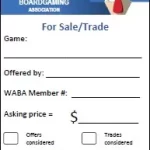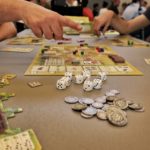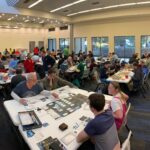WABA Game Collection
WABA maintains a collection of over 350 games that we have purchased or have been donated by companies and individuals. These games are available to WABA members at our Mt. Claremont and Thornlie events. Not all games in the WABA Collection are at all events due to space restrictions. If you wish to play a specific game at a WABA event, please let us know as early as possible so that we can try to arrange its transport.
A complete list of the games in the WABA collection can be found on boardgamegeek.com
WABA Starter Tubs
The WABA starter tubs are an excellent way to sample some of the new ideas introduced in modern boardgames. You’re probably already familiar with ‘roll and move’ games like Monopoly or Snakes and Ladders where you roll some dice and move your piece around the board. The following 11 games introduce some of the most common ways of playing a modern board game as well as some great themes to dive into.
There is a WABA Starter Tub available for use at both Mt Claremont and Thornlie events.
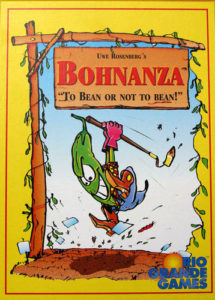
Bohnanza (negotiation/trading) – Beans, glorious beans. You’re a farmer looking to plant your crop (of beans of course), but you also want to make your job easier by planting lots of the same bean type. It’s a good thing that you know lots of other bean farmers willing to trade. While this sounds simple at first, you need to carefully consider the order in which you take cards and make trades as you can only plant your beans in the order in which you receive them (you can’t rearrange your hand).
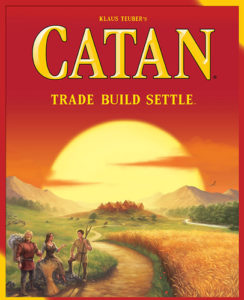
Catan (resource management) – Welcome to the island of Catan. The race is on to build your empire and outpace your opponents. Will you grow massive cities or dozens or towns, will you set up a great trade road or amass a giant army. No matter your plan you’ll need to make deals and trade with other players to secure the resources you need or find yourself left behind.
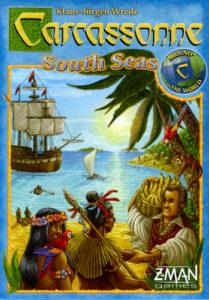
Carcassonne: South Seas (tile laying) – In Carcassonne: South Seas you are a trader selling goods in the South Seas. You’ll work with other players at the table to explore the island chain, revealing an ever growing tableau and capturing resources to sell to awaiting trade ships. The game involves laying tile pieces and using your “meeples” (wooden, people shaped pawns) to stake your claim on the goods provided by sets of tiles.
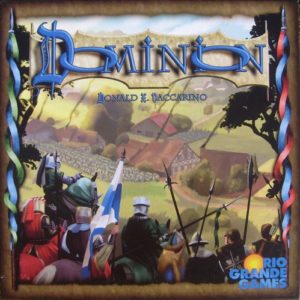
Dominion (deck building) – In Dominion, you play a powerful noble looking to expand your lands. You’ll make use of the various experts and artisans in your realm, bringing them into your employ and using their skills to earn enough money to buy the lucrative land cards needed for victory. Dominion rewards players who can use their cards to maximum effect by finding clever combinations to play. It’s very quick to learn, but even after one game you’ll be keen for another to continue mastering it.
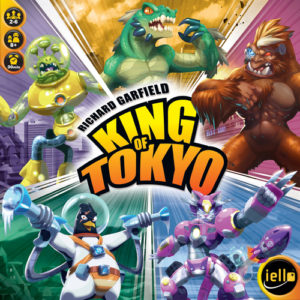
King of Tokyo (dice rolling/combat) – In King of Tokyo you’ll take on the role of a giant monster, battling for control of Tokyo, just like those great movies from the 50s and 60s. On your turn, you’ll roll dice to attack other monsters, regain health, claim victory points or stockpile energy to buy powerful cards to help you claim the crown. The player who can keep their monster in Tokyo for the longest, repelling the assaults of other monsters will be the victor and King of Tokyo.
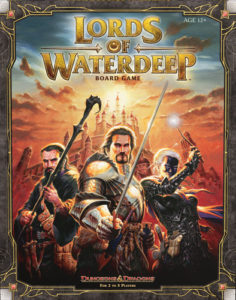
Lords of Waterdeep (worker placement) – Fans of the Dungeons & Dragons universe might recognise the city of Waterdeep but don’t be fooled into thinking you’ll be slaying dragons or delving into dungeons. This is a game about exerting power and pulling strings. As a Lord of Waterdeep, you’ll look to exploit the resources of the city for maximum prestige and profit. You’ll recruit soldiers, wizards, rogues and priests to your cause and send them out to capture treasures, buy up businesses and complete grand quests. Watch the board carefully, as your opponent might grab the final piece of your plan, or perhaps you’ll be the one foiling theirs with a shrewd play.
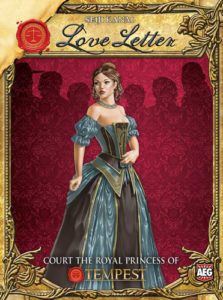
Love Letter (deduction/hidden roles) – You’ve penned a beautiful love letter, but your plans to deliver it to the Princess are being foiled by her other suitors and members of the court. In this game, you receive a hidden role (you could be the castle guard, a baron, or even the Princess herself!) that changes throughout the game. You are trying to deduce which roles your opponents have before they can do the same to do. This game takes two minutes to learn and five minutes to play, and is a great introduction to the wide world of social deduction games.
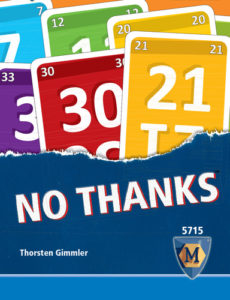
No Thanks! (auction/bidding) – No Thanks! is played with a small deck of cards and some small red No Thanks! chips. The goal of the game is to get the lowest score possible. You can avoid scoring some cards by creating runs (5, 6, 7), allowing you to score only the lowest card in the run (e.g. 5). Alternatively you can throw in one of your eleven “No Thanks!” chips which are worth -1 at the end of the game, but more importantly allow you to pass on taking a card. It’s then up to the next player to take it or throw in one of their chips. This is an excellent introduction to auction games, where the value of what’s being offered will often be determined by how much the players want it.
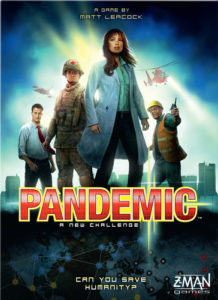
Pandemic (cooperative play) – A cooperative game is a game in which all players work together to beat the game. They win or lose as a team. In Pandemic, you are members of the CDC, and a string of pandemics have broken out across the planet. You’ll need to put your skills to the test as you travel around the world containing outbreaks and curing diseases. Using your character’s unique abilities, it’s a race against time as you and your team fight the pandemic as humanity’s last hope.
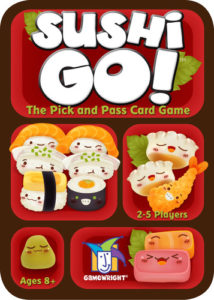
Sushi Go! (card drafting) – It’s lunch time rush at your favourite sushi restaurant. The dishes whiz by on the sushi train so you’ll need to be quick to snap up the best dishes or lose them to the other patrons. Sushi Go! is a perfect introduction to the genre of card drafting, where you can take any card you want, but then you must pass the rest to your opponent, giving them the choice of what’s left!
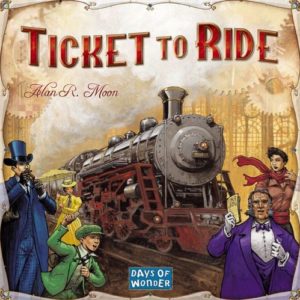
Ticket to Ride (route building) – The great railways of North America are up for grabs in Ticket to Ride. You’ll need to collect train cards of the correct colours and match them to the various routes on the board. You can also complete specific routes from your ticket cards or compete for the longest route for extra points at the end of the game. Watch out though, as each player’s rail network grows you might find yourself cut off from your destination.


